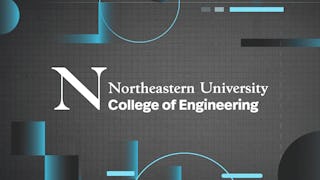Are you curious about the lucrative field that is software engineering and how you might be a part of it? This is the course for you! By taking this course, you will gain foundational knowledge of software development, programming, and the many exciting job roles and career paths that the IT industry offers.

Heat up your career this summer with courses from Google, IBM, and more for £190/year. Save now.


Introduction to Software Engineering
This course is part of multiple programs.


Instructors: Rav Ahuja
281,759 already enrolled
Included with 
(3,504 reviews)
Recommended experience
What you'll learn
Explain the principles of software engineering, the Software Development Life Cycle (SDLC), and software development tools, technologies, and stacks
Differentiate between programming language types and apply basic programming constructs such as loops, conditionals, and functions using Python
Summarize key software architecture and design approaches, including common architectural and deployment patterns
Outline the roles, skills, and career paths in software engineering
Skills you'll gain
- Software Design Patterns
- Software Development
- Python Programming
- Software Development Life Cycle
- Development Environment
- Programming Principles
- Software Development Methodologies
- Software Architecture
- Software Engineering
- Software Engineering Tools
- Engineering Software
- Computer Programming
- Systems Architecture
- Software Documentation
- Application Development
- Program Development
- Object Oriented Programming (OOP)
- Agile Methodology
- Unified Modeling Language
- Software Design
Details to know

Add to your LinkedIn profile
16 assignments
See how employees at top companies are mastering in-demand skills

Build your subject-matter expertise
- Learn new concepts from industry experts
- Gain a foundational understanding of a subject or tool
- Develop job-relevant skills with hands-on projects
- Earn a shareable career certificate

There are 6 modules in this course
In this module, you’ll explore the fundamentals of software engineering and what sets it apart from software development. You’ll learn how software engineering roles contribute to building reliable, high-quality systems, and how the Software Development Life Cycle (SDLC) helps structure and streamline projects. You’ll break down each phase of the SDLC, examine how requirements are gathered and documented, and compare key specification documents such as the User Requirement Specification (URS), Software Requirement Specification (SRS), and System Requirement Specification (SysRS). You’ll also evaluate different development models, including Waterfall, the V-model, and Agile, and determine when to use each. As you progress, you’ll become familiar with software versioning, various types of software testing, and the documentation needed throughout the development process. Finally, you’ll identify common roles in software engineering projects.
What's included
14 videos1 reading3 assignments1 plugin
In this module, you will explore the foundational roles of front-end, back-end, and full-stack development in building web and cloud applications. You’ll learn how HTML, CSS, and JavaScript create interactive user interfaces, while server-side operations handle data and support functionality. The module also introduces collaborative development practices such as squads and pair programming. Additionally, you will learn to classify technologies within software architectures, examine key development tools, and gain hands-on experience using an Integrated Development Environment (IDE) to write and execute code.
What's included
11 videos1 reading3 assignments1 app item1 plugin
In this module, you will examine different types of programming languages, including compiled, interpreted, query, and assembly languages, and evaluate their use in various development scenarios. You’ll explore core programming constructs such as variables, control flow, loops, and functions, while learning how to organize code using procedural, modular, and object-oriented approaches. In addition, through hands-on practice, you’ll compare language syntax by writing basic programs in multiple languages. You’ll also use Python to implement programming fundamentals. The module also emphasizes selecting appropriate languages and structures based on performance, portability, and debugging needs.
What's included
8 videos1 reading3 assignments2 app items1 plugin
In this module, you will explore the role of software architecture in managing system complexity and supporting quality attributes such as scalability, reliability, and maintainability. You’ll learn to apply object-oriented analysis and design principles, use modeling tools like UML to visualize system structure and behavior, and create architectural diagrams to represent component interactions. The module also introduces common architectural patterns, such as layered, client-server, and microkernel, and compares application architecture approaches like monolithic, microservices, and serverless. Additionally, you will examine the characteristics of different deployment environments and identify key components required for reliable production deployment.
What's included
9 videos1 reading3 assignments1 plugin
In this module, you will explore the diverse roles, responsibilities, and career paths within the field of software engineering. You’ll learn to differentiate between software engineers and developers, analyze typical workdays, and identify the key technical and soft skills needed for success. The module examines current job market trends and growth prospects, outlines various job titles and responsibilities, and helps you map roles to real-world project contexts. You’ll also consider professional ethics in software engineering, applying established codes of conduct to real-life scenarios.
What's included
10 videos1 reading3 assignments1 plugin
The final module of this course includes both the final, graded assessment and a project. The assessment consists of 20 multiple-choice questions. For the final project, you will apply what you’ve learned by analyzing a real-world job posting and demonstrating your ability to connect course concepts to practical career opportunities.
What's included
2 readings1 assignment1 app item1 plugin
Earn a career certificate
Add this credential to your LinkedIn profile, resume, or CV. Share it on social media and in your performance review.
Instructors


Offered by
Explore more from Software Development
 Status: Free Trial
Status: Free Trial Status: Free Trial
Status: Free Trial Status: Free Trial
Status: Free Trial Status: Free Trial
Status: Free TrialNortheastern University
Why people choose Coursera for their career




Learner reviews
3,504 reviews
- 5 stars
77.25%
- 4 stars
17.50%
- 3 stars
3.07%
- 2 stars
0.93%
- 1 star
1.22%
Showing 3 of 3504
Reviewed on Sep 11, 2024
This course surprised me in its applicability to software development. It is a great first course in establishing a foundation of programming before actually doing any programming itself.
Reviewed on Dec 10, 2023
Pauses are needed when transitioning to different topics.. at times I guess we students get confused when does a sub topic start within the video and when does it end
Reviewed on May 21, 2024
This fantastic course provides the foundation and knowledge of different technical roles, methodologies, frameworks, jobs to consider, and advice from SMEs on this career journey.

Open new doors with Coursera Plus
Unlimited access to 10,000+ world-class courses, hands-on projects, and job-ready certificate programs - all included in your subscription
Advance your career with an online degree
Earn a degree from world-class universities - 100% online
Join over 3,400 global companies that choose Coursera for Business
Upskill your employees to excel in the digital economy
Frequently asked questions
Access to lectures and assignments depends on your type of enrollment. If you take a course in audit mode, you will be able to see most course materials for free. To access graded assignments and to earn a Certificate, you will need to purchase the Certificate experience, during or after your audit. If you don't see the audit option:
The course may not offer an audit option. You can try a Free Trial instead, or apply for Financial Aid.
The course may offer 'Full Course, No Certificate' instead. This option lets you see all course materials, submit required assessments, and get a final grade. This also means that you will not be able to purchase a Certificate experience.
When you enroll in the course, you get access to all of the courses in the Certificate, and you earn a certificate when you complete the work. Your electronic Certificate will be added to your Accomplishments page - from there, you can print your Certificate or add it to your LinkedIn profile. If you only want to read and view the course content, you can audit the course for free.
If you subscribed, you get a 7-day free trial during which you can cancel at no penalty. After that, we don’t give refunds, but you can cancel your subscription at any time. See our full refund policy.
More questions
Financial aid available,

